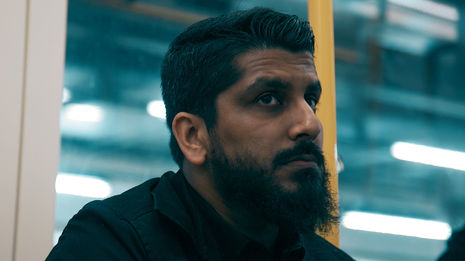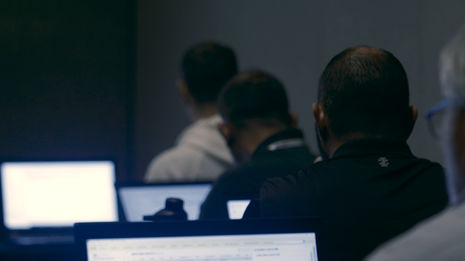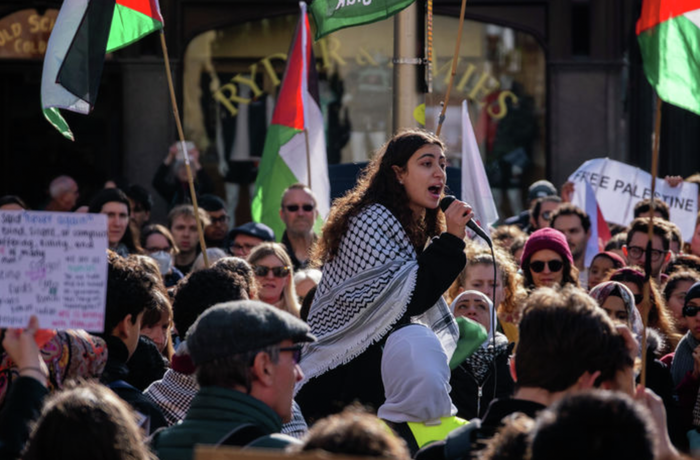Phantom Parrot details GCHQ’s obtrusive data collection policy
Alexander Brian reviews the documentary screening and Q&A at Arts Picturehouse

“Things like this always make me want to destroy my phone,” my co-editor whispers as we exit Arts Picturehouse, still shaken by the documentary we had just seen. However, if we have reason to fear the amount of personal information that can be gleaned from our devices, this pales in comparison to the experience of human rights activists like Muhammad Rabbani, the focus of Kate Stonehill’s Phantom Parrot.
Rabbani is the international director of Cage, an organisation that campaigns for Muslims held under war-on-terror laws. In 2016, he was returning from Qatar, where he had been investigating the FBI’s torturing of a suspected terrorist in a US jail, when he was detained under Schedule 7 of the Terrorism Act 2000.
“The documentary has multiple strands which converge satisfyingly by the end”
Introduced before the widespread use of smartphones, the law allows counter-terrorism police to detain anyone entering the UK for up to six hours without requiring a justification. During this time, the detainee can be arrested for refusing to provide information, including the passcodes to their devices.
Rabbani has experienced the full force of this act multiple times, both before and after the incident in 2017. However, only then was he arrested – and ultimately found guilty – for withholding his passwords to protect the privacy of his clients.
The documentary has multiple strands which converge satisfyingly by the end. These include excerpts of the parliamentary debates that preceded the passing of the Terrorism Act, highlighting the lack of opposition (only Jeremy Corbyn voted against the bill) and interest (the green benches looked disconcertingly empty) from MPs.
Phantom Parrot also showcases the day-to-day work of Cage. When helping the aforementioned suspected terrorist, Ali al-Marri, to publicise documents obtained by his lawyers detailing his experiences of torture, the organisation sought to promote the best possible media coverage by emphasising his humanity. Such moments highlight an interesting parallel between the role of Cage and that of the documentarian, whose attempts to inspire sympathy for Rabbani include featuring him alongside his family.
“I must admit feeling apprehensive before embarking on this two-hour documentary”
For viewers questioning the notable absence of ghostly tropical birds, there are expert witnesses to explain GCHQ’s “Phantom Parrot” scheme. Exposed by Edward Snowden, the programme involves exploiting Schedule 7 to demand access to people’s devices in order to download their data and upload it to a central database.
I must admit feeling apprehensive before embarking on this two-hour documentary. However, the film remained engaging by adopting the aesthetics of fictional accounts of state surveillance such as The Capture (2019) or You Are Wanted (2017). Upward shots of government buildings work to symbolise state power while a thundering soundtrack locks viewers in a constant state of tension. The documentary even manages to make politicians sound interesting, which is no small feat! Some might argue that this aesthetics trivialises a serious issue by rendering it perversely exciting. Yet these techniques are what encourage the audience to empathise with Rabbani and engage with the issue in the first place.

Indeed, my only criticism would be the lack of clarity surrounding the sources of the footage. Rabbani’s interview during his Schedule 7 detention is effectively reproduced using animation. Yet the rest of the film comprises real footage rather than reconstructions – something which would have been useful to know while watching. For instance, the scenes at the US security conference were so unnerving that I struggled to believe they had received permission to film there. Likewise, news reports zip across the screen before you have time to digest them.
Nevertheless, Stonehill does a skilful job of highlighting not only Rabbani’s plight but also its wider implications. For example, the documentary ends by explaining that, in 2002, Schedule 7 was extended to migrants arriving on small boats. The urgency of the issues raised in Phantom Parrot became even clearer during the Q&A after the screening, when Rabbani highlighted Michael Gove’s recent decision to shift the focus of the official definition of extremism from action to ideology, citing Cage as an organisation that would need to be reassessed under the new guidance.
As well as mentioning others who have been targeted by Schedule 7 – including French publisher Ernest Moret – Rabbani stressed the film’s essential applicability to anyone: “We might not be a torture victim, nor may we know a torture victim. We should all stand with each other … If we can create a situation where ordinary people are not sleepwalking into surveillance society, I think that’s a real result.”
Hence, while my co-editor’s response to the documentary might have been a little extreme, she was making an important point: these issues affect us all yet are rarely discussed. Documentaries like Phantom Parrot play a crucial role in starting this conversation and pushing people to act.
 News / Deborah Prentice overtaken as highest-paid Russell Group VC2 February 2026
News / Deborah Prentice overtaken as highest-paid Russell Group VC2 February 2026 News / Christ’s announces toned-down ‘soirée’ in place of May Ball3 February 2026
News / Christ’s announces toned-down ‘soirée’ in place of May Ball3 February 2026 Fashion / A guide to Cambridge’s second-hand scene2 February 2026
Fashion / A guide to Cambridge’s second-hand scene2 February 2026 News / Downing Bar dodges college takeover31 January 2026
News / Downing Bar dodges college takeover31 January 2026 Comment / Men at Cambridge are experiencing equality2 February 2026
Comment / Men at Cambridge are experiencing equality2 February 2026










